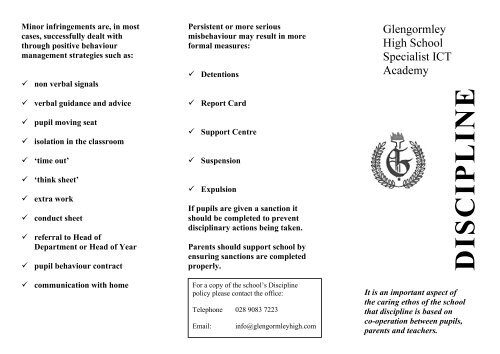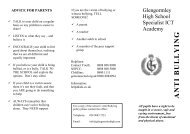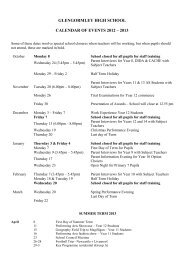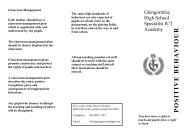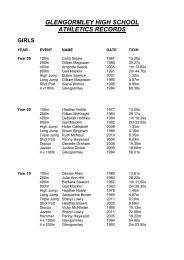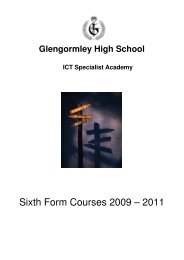Discipline policy summary - Glengormley High School
Discipline policy summary - Glengormley High School
Discipline policy summary - Glengormley High School
You also want an ePaper? Increase the reach of your titles
YUMPU automatically turns print PDFs into web optimized ePapers that Google loves.
Minor infringements are, in most<br />
cases, successfully dealt with<br />
through positive behaviour<br />
management strategies such as:<br />
non verbal signals<br />
verbal guidance and advice<br />
pupil moving seat<br />
isolation in the classroom<br />
‘time out’<br />
‘think sheet’<br />
extra work<br />
conduct sheet<br />
referral to Head of<br />
Department or Head of Year<br />
pupil behaviour contract<br />
communication with home<br />
Persistent or more serious<br />
misbehaviour may result in more<br />
formal measures:<br />
Detentions<br />
Report Card<br />
Support Centre<br />
Suspension<br />
Expulsion<br />
If pupils are given a sanction it<br />
should be completed to prevent<br />
disciplinary actions being taken.<br />
Parents should support school by<br />
ensuring sanctions are completed<br />
properly.<br />
For a copy of the school’s <strong>Discipline</strong><br />
<strong>policy</strong> please contact the office:<br />
Telephone 028 9083 7223<br />
Email:<br />
info@glengormleyhigh.com<br />
DISCIPLINE<br />
It is an important aspect of<br />
the caring ethos of the school<br />
that discipline is based on<br />
co-operation between pupils,<br />
parents and teachers.
All pupils undertake a taught<br />
programme of Personal and Social<br />
Education where they receive<br />
guidelines on conduct and good<br />
classroom behaviour.<br />
A code of conduct and good<br />
classroom behaviour is printed in<br />
each pupil’s homework diary.<br />
Teachers use various teaching<br />
strategies and styles in a range of<br />
classroom environments and<br />
additional guidelines may be<br />
added in different areas of study.<br />
Pupils whose conduct is<br />
commendable are openly praised<br />
and encouraged. A wide range of<br />
rewards is used to recognise good<br />
work and behaviour:<br />
Written comments on work<br />
Stickers and ‘stamps’<br />
Certificates<br />
Display of pupils’ work<br />
Cups and trophies<br />
Pupils are expected to arrive<br />
promptly for school at 8.55 am<br />
Pupils should arrive for each<br />
lesson on time<br />
Pupils should be properly<br />
prepared for class and carry a<br />
school bag<br />
All pupils are expected to<br />
observe the general standards<br />
of dress and uniform<br />
requirements<br />
Pupils should address all staff<br />
appropriately and politely<br />
Certain items (eg. mobile<br />
phones, personal music<br />
players) must not be used in<br />
school and may be<br />
confiscated.<br />
For those pupils who have<br />
difficulties settling into school<br />
routines, behave in an<br />
unacceptable way, find themselves<br />
in a situation which they find<br />
stressful, or continually infringe<br />
rules, various support networks<br />
are used.<br />
PUPILS ARE EXPECTED TO<br />
FOLLOW TEACHER AND<br />
OTHER STAFF<br />
INSTRUCTIONS WITHOUT<br />
ARGUMENT<br />
<strong>Discipline</strong> is based on<br />
fairness and firmness in the<br />
application of school rules.<br />
The primary motive for<br />
applying a sanction is to<br />
ensure the behaviour of the<br />
pupil improves.<br />
Sanctions imposed will be<br />
appropriate to the pupil and<br />
the situation.<br />
Sanctions may be applied<br />
taking into consideration<br />
wider issues than the<br />
immediate incident.<br />
Disruptive pupils will not be<br />
permitted to interrupt the<br />
work of teachers and other<br />
pupils


